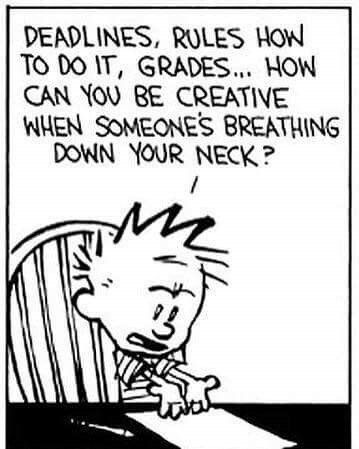I talk about BGS and headship on Twitter. Sometimes Twitter talks back. It occasionally sends welcome distractions, like when the following image pinged on my screen:

I enjoyed the philosophical musings of characters Calvin and Hobbes as a student and this cartoon presents a familiar dialectic. Creativity versus the cramping effect of school structure and assessment? Good versus evil? Admittedly that might be overplaying it a bit.
Sir Ken Robinson is a familiar ‘go to’ on the topic of creativity. I first read his book ‘The Element, How Finding Your Passion Changes Everything’ almost ten years ago. The message therein has stayed with me, although the author is perhaps best known for his TED lecture ‘Do schools kill creativity?’ which is a must watch, and entertaining grist for anyone interested in child development and schooling. Robinson’s work is applauded, and he argued this:
“We are educating people out of their creative capacities. Picasso once said this – he said that all children are born artists. The problem is to remain an artist as we grow up. I believe this passionately, that we don’t grow into creativity, we grow out of it. Or rather, we get educated out of it. So why is this?”
Robinson has answers of course, broad in scope. So does young Calvin, the boy in the cartoon, although his thoughts are a touch narrower. You might agree with Calvin and Ken? And if you do, or if you don’t, or you simply like debate and a bit of brain gym, and you’ve stuck with the blog this far, then do watch the TED talk which provides a welcome challenge to ‘modern’ educational systems.
Schools like Bradford Grammar offer a breadth of curriculum and experience within a liberal and progressive educational framework. We do not advocate on behalf of a hierocracy of subjects or pedagogy, and we cherish the arts and STEM, and everything in between, including wider co-curricular activities, equally. On so doing, however, we sometimes have to swim against a societal tide of opinion and we fully acknowledge that background bias exists within the building blocks of the educational and assessment systems to which we belong.
We don’t have to be content with that, and many teachers, not just at BGS, welcomed for example the move by The Russell Group of universities to scrap their list of “facilitating subjects” to potentially help applicants achieve a place at a top university. Hopefully, Progress 8 will go the same way and thus give the arts in school more of a fighting chance.
I continue, however, to be irked by the simplistic portrayal of arts subjects as the only fertile ground for creativity in schools. I’m a Geographer and guiding GCSE students through a process of informed speculation in class or the field has always been a lively and rewarding exercise. On a trip to Cemlyn Bay, Anglesey, we studied a beach that wasn’t behaving as the textbook suggested. Could unseasonal spring storms have had an effect? Might prevailing, dominant winds be countered by lighter occasional wind and waves from the opposite direction thus redistributing smaller, more easily moved sediment back along the beach? Could the geometry of beach, which is a bar, have an influence, and if so, what? Does ‘that little river over there in the distance’ introduce alluvial sediment into a marine environment masking expected patterns? Or is it aliens, or English tourists, or both? Creativity was certainly required surveying sand dunes at Cala Mesquida, Mallorca when our A-Level geographers stumbled across naked Germans in the nudist sunbathing area. The fact our students had clip boards, 30cm rules and tape measures in hand didn’t help matters.
As for deadlines and grades resulting in a dearth of creativity? Not necessarily I would say. Opportunities for creativity, wherever they exist in the wider curriculum, are not snuffed out simply because a modicum of discipline is applied to the creative process or end results are assessed in some form or other. I think that’s fairly obvious? The magnificent artwork that hangs on the walls of Bradford Grammar School seems not to have suffered because it was created for a qualification. Experimentation, trial and error, expression and joy are manifestly clear hanging on the walls of our classrooms and corridors. And doesn’t a deadline and a wee bit of process focus the mind and motivate? And none of this takes away from the fact that sometimes we should also do things just for fun in schools.
The amount, timing, methodology and relative importance of assessment can make all the difference. The focus in the UK should be less on routine summative measurement of knowledge and competency per se, and more about low stakes formative assessment to chart and support someone’s developing identity as a capable and adaptable person. But what do I know? Calvin would have an answer to that question too; and judging by the cartoon below he might not think very much of teachers?

“Experimentation, trial and error, expression and joy are manifestly clear hanging on the walls of our classrooms and corridors. And doesn’t a deadline and a wee bit of process focus the mind and motivate? And none of this takes away from the fact that sometimes we should also do things just for fun in schools.”
